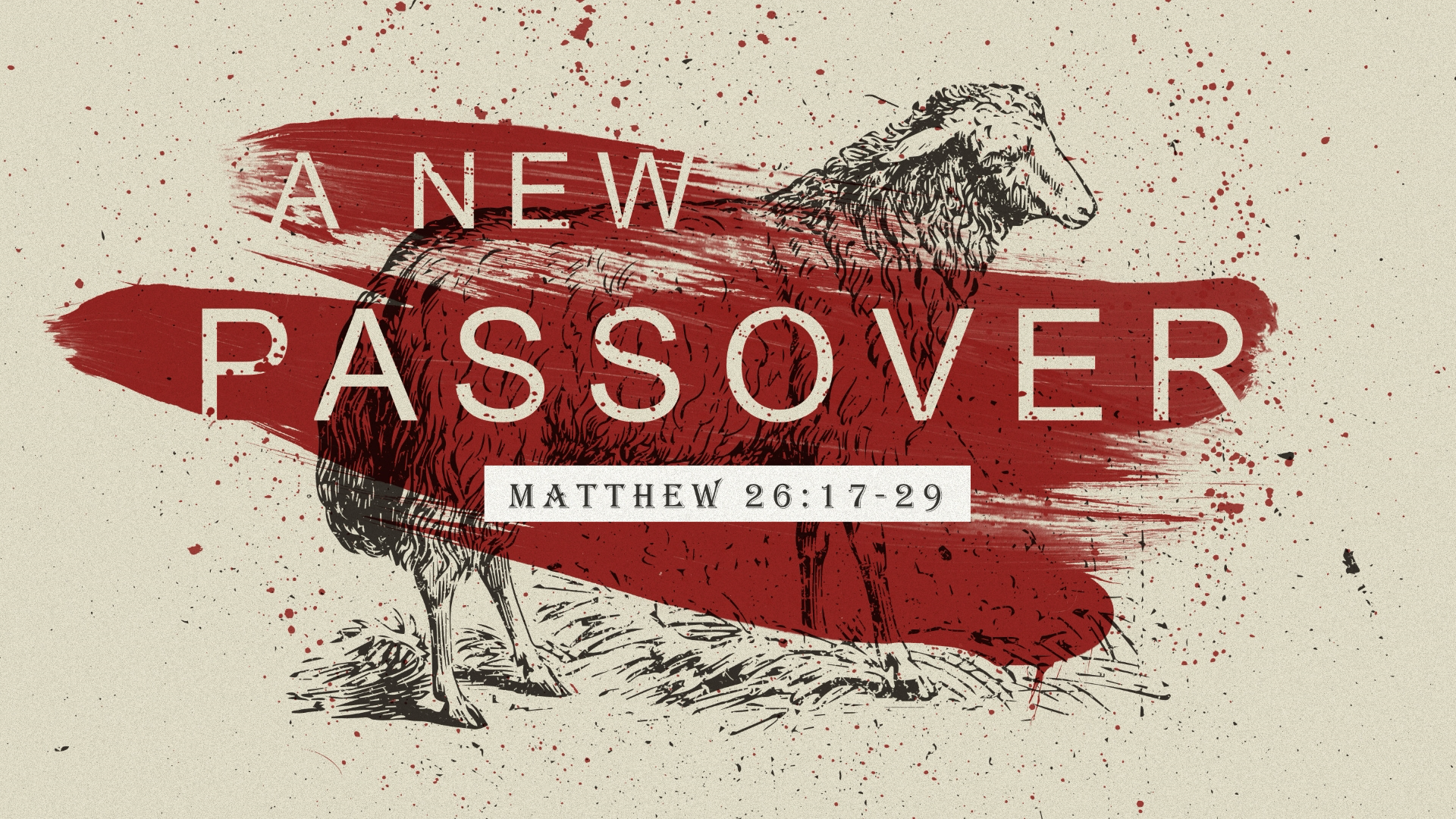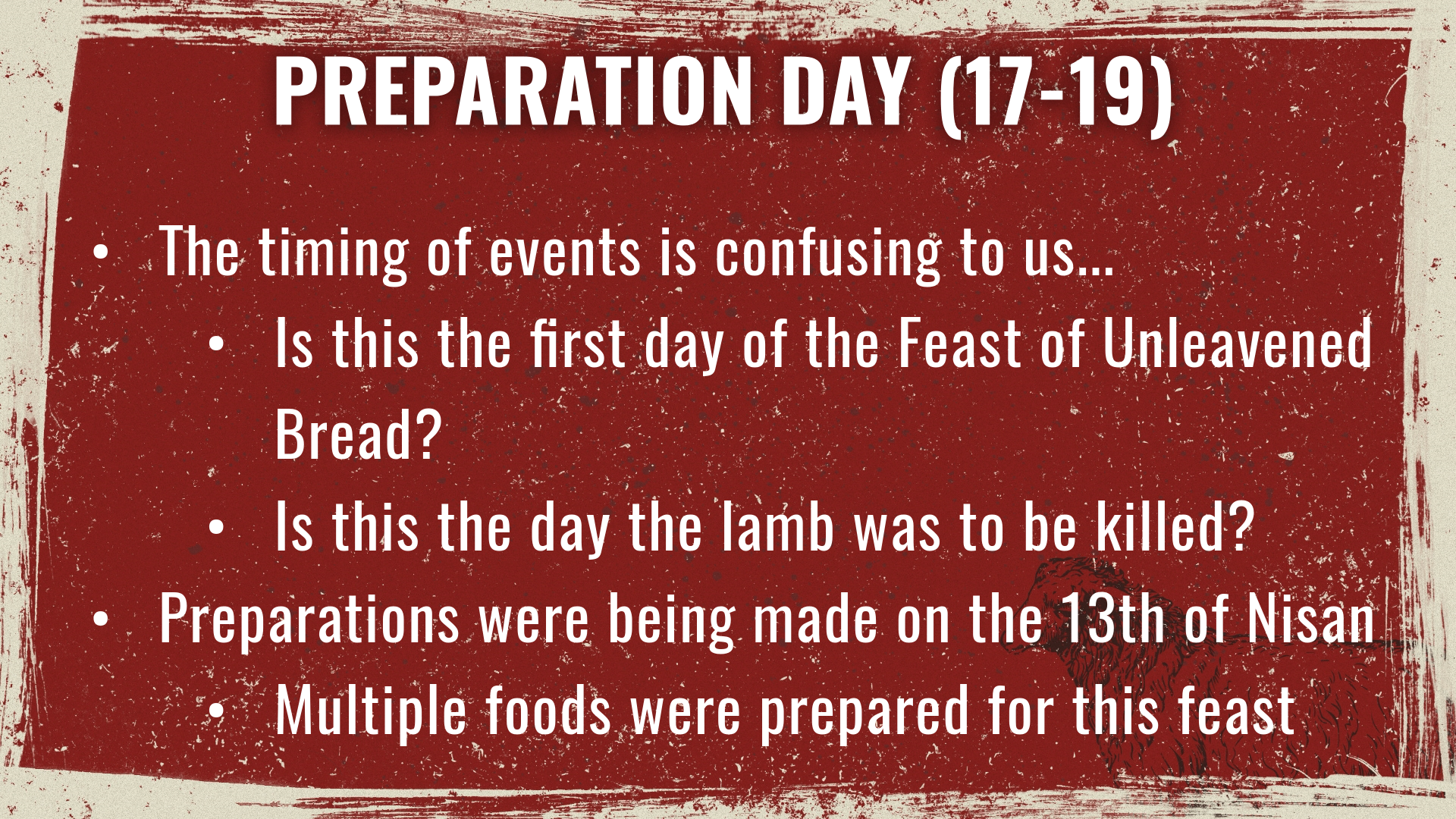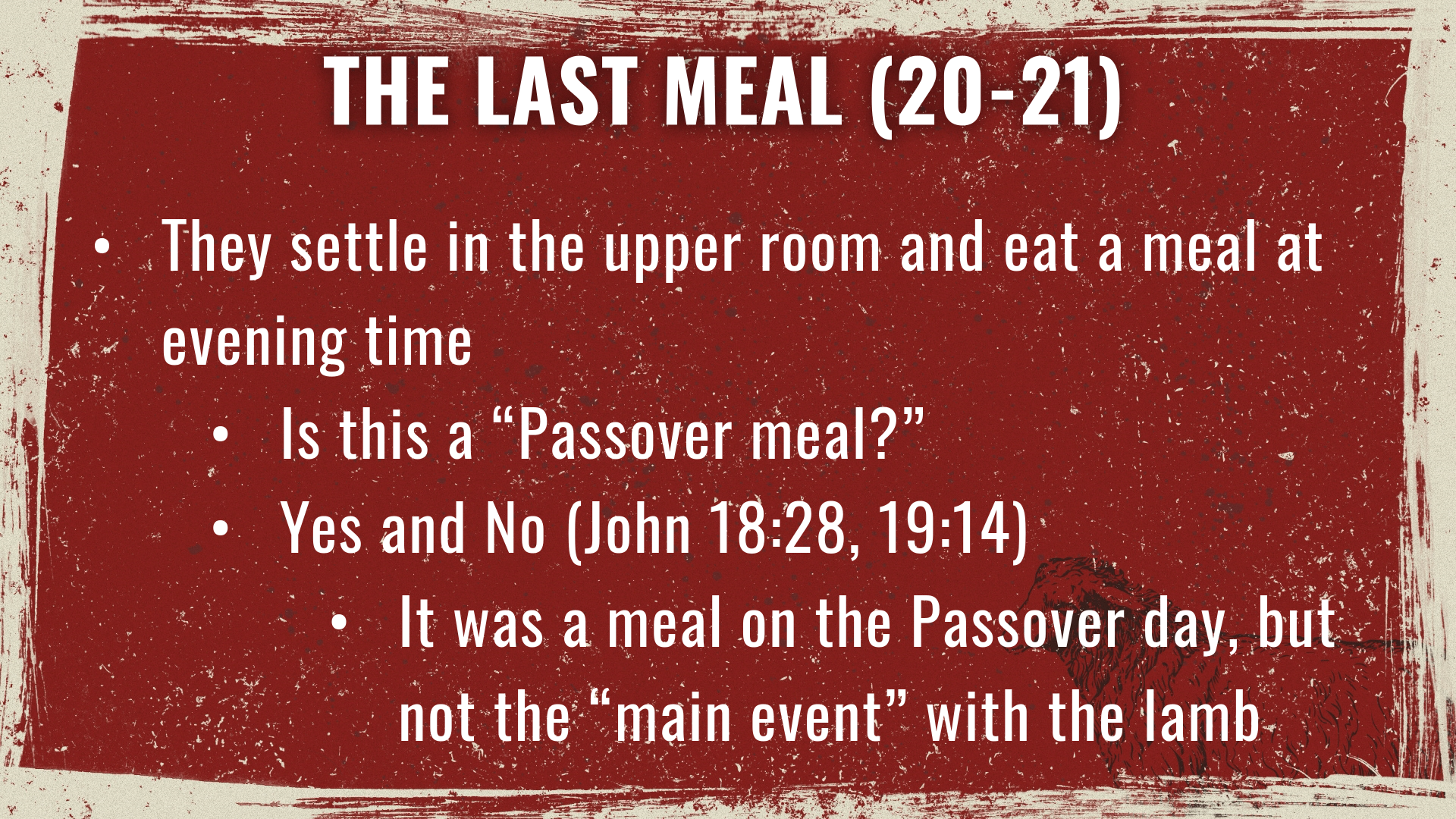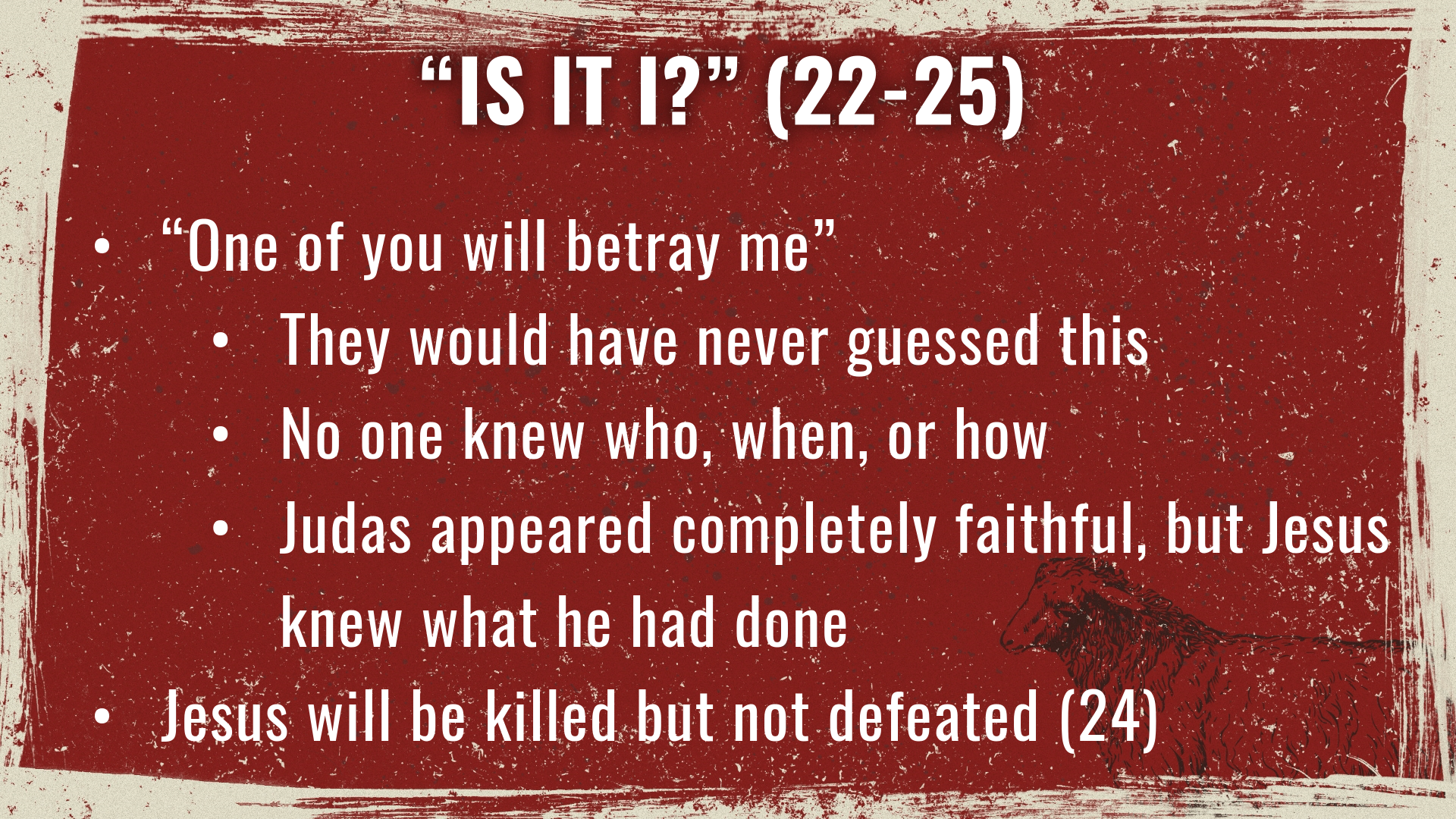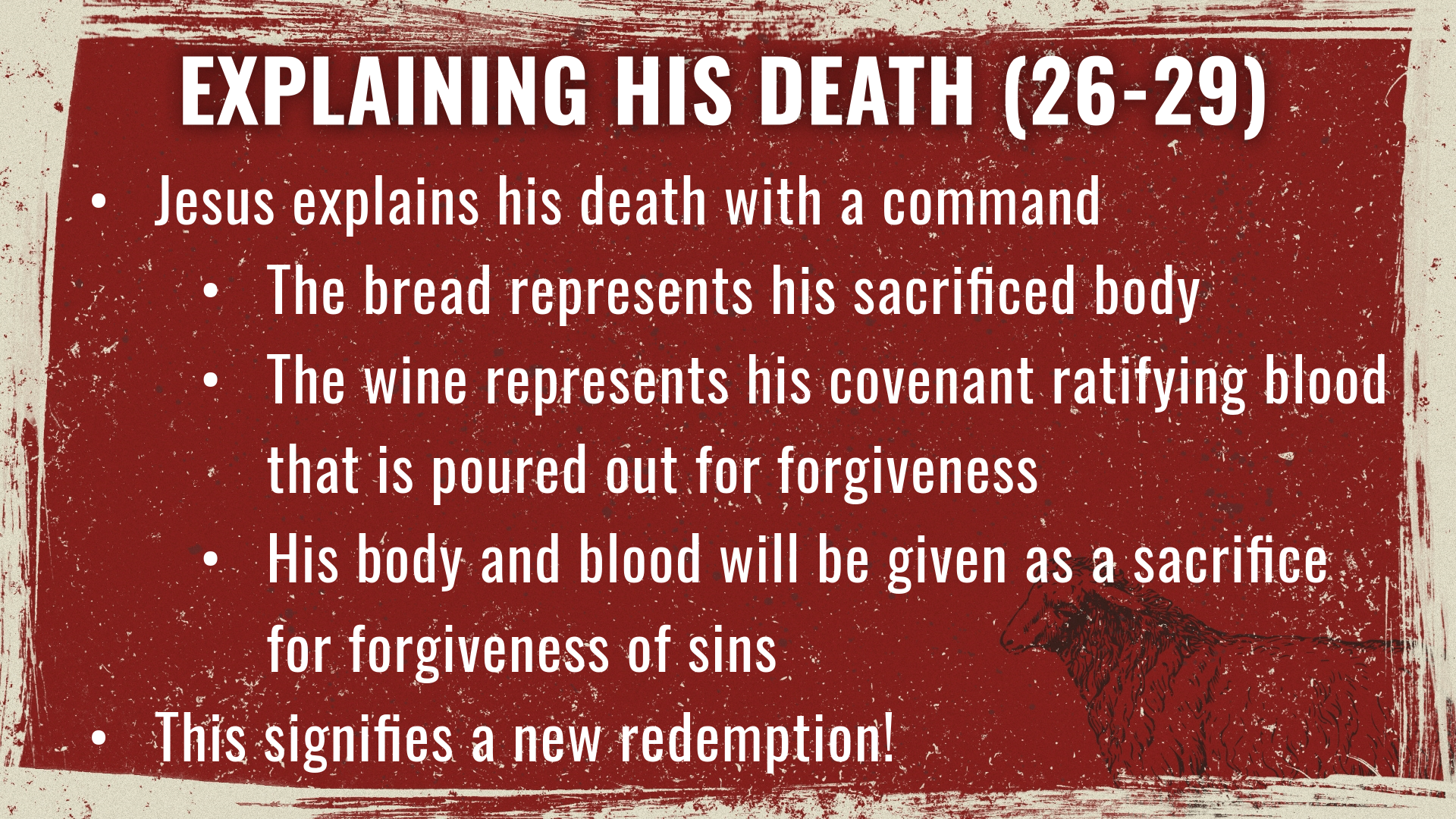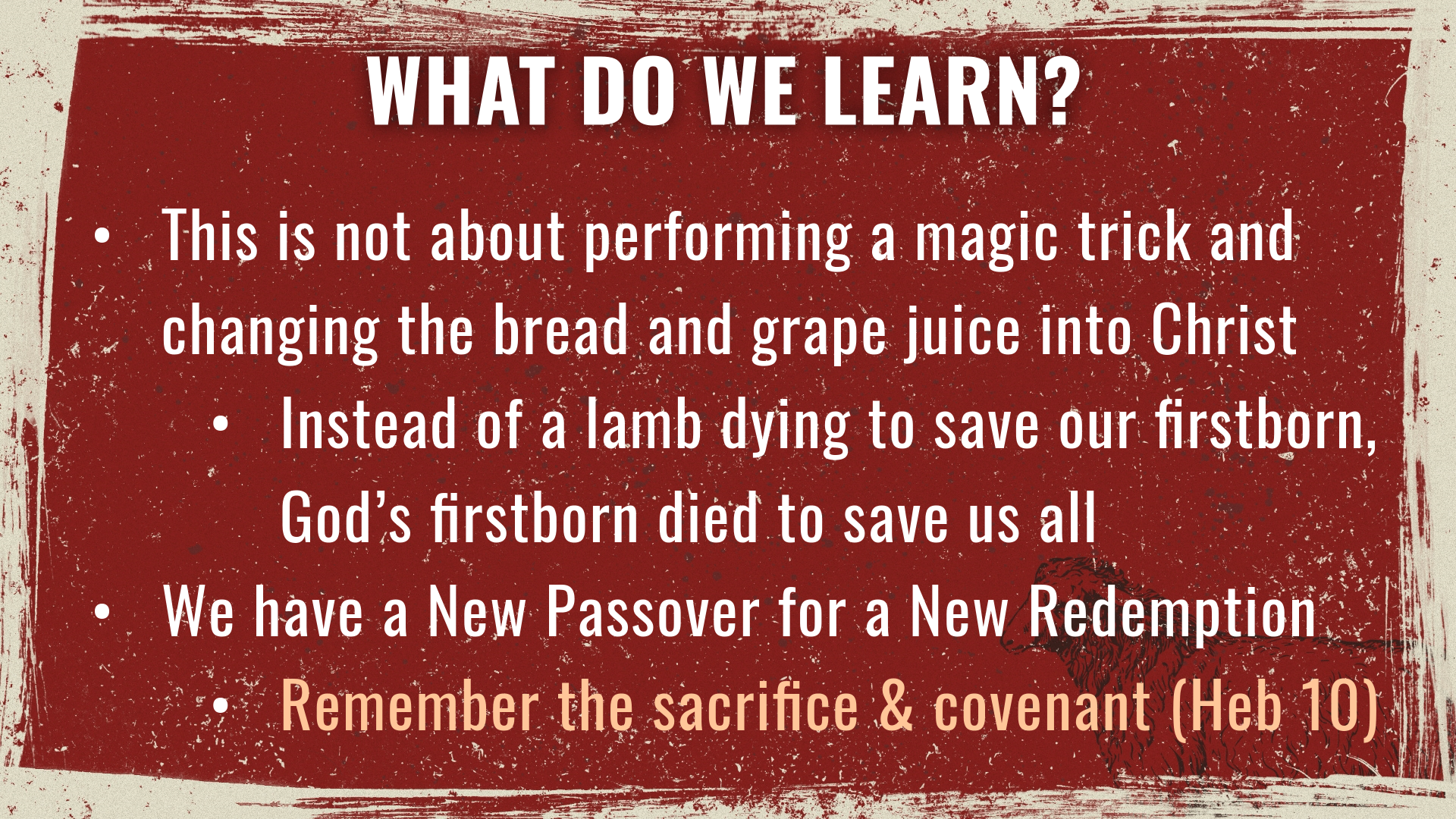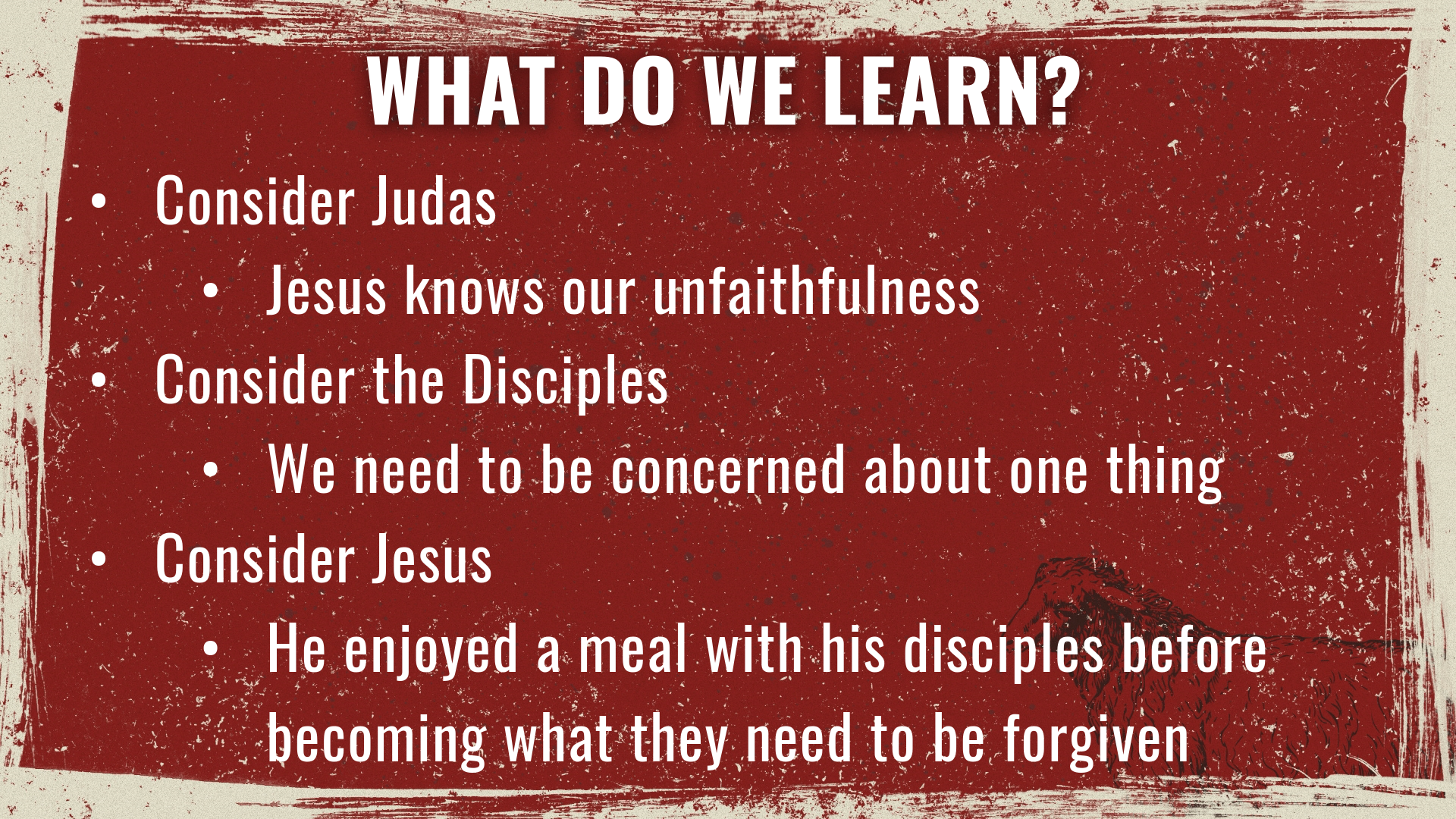The New Passover (Matthew 26:17-30)
Many people are getting ready for a great feast. Some of us have gone all out with preparations, and we are starting to get excited about the family coming over. It’s time to celebrate Thanksgiving. This is the greatest of our manmade holidays, where we thank God for all His blessings.
But there is another feast that Christians take part in on the first day of every week. It is more significant than Thanksgiving. Do we see it that way? On the first day of every week, we gather to eat a meal to memorialize our Savior, who makes this relationship possible. It’s a privilege to come together and worship God with praise and adoration. Many people do not see it as an enjoyable way to spend their time. They think it’s a waste of time, but they don’t understand how blessed we are to have a relationship with God.
Today, we are going to study a text that explains why we observe the Lord’s Supper. This is a text about the Lord’s Supper being established.
The Feast of Unleavened Bread/Passover (17-19)
Matthew 26:17--19 (ESV) --- 17 Now on the first day of Unleavened Bread the disciples came to Jesus, saying, “Where will you have us prepare for you to eat the Passover?” 18 He said, “Go into the city to a certain man and say to him, ‘The Teacher says, My time is at hand. I will keep the Passover at your house with my disciples.’ ” 19 And the disciples did as Jesus had directed them, and they prepared the Passover.
When we look at this text, we see several confusing things. First, notice that Matthew says it is the first day of Unleavened Bread. Does that mean that it is the first day of the feast of unleavened bread? No, it can’t be that because the Passover happens, the day before the feast of unleavened bread begins. Passover is on the 14th day of Nisan, but the feast of Unleavened Bread is on the 15th day. So why do they call it the first day of Unleavened Bread?
The Feast of Unleavened bread required the Israelites to remove all of the leavening agents from their house and keep them out for an entire week. So, it makes sense for them to do this on the day before Passover. There would also be extensive preparations for the Passover meal. Traditionally, they would also prepare several symbolic dishes with the unleavened bread and the Passover Lamb. They would prepare bitter herbs, which represent the bitterness of being enslaved in Egypt, and a paste called “charoseth” made of apples, dates, pomegranates, and nuts. This would represent the sweetness of being delivered. They would use this to dip the unleavened bread in, and it would probably remind them of the mortar they would use to make bricks. They would also put a cinnamon stick in the paste to represent the straw that they were forced to gather for themselves. We could imagine that gathering everything they need and making all of this would take some time. They would also drink from four cups of wine to remember what God said in Exodus 6.
Exodus 6:6--7 (ESV) --- 6 Say therefore to the people of Israel, ‘I am the Lord, and I will bring you out from under the burdens of the Egyptians, and I will deliver you from slavery to them, and I will redeem you with an outstretched arm and with great acts of judgment. 7 I will take you to be my people, and I will be your God, and you shall know that I am the Lord your God, who has brought you out from under the burdens of the Egyptians.
Of course, the main course of Passover was the lamb. This lamb was supposed to be a male, about a year old, without blemish, and it was to be chosen on the 10th day of the month of Nisan (Exo 12.3). So they would all be taking care of this lamb for four days. But the lamb would be killed by the priest at twilight on the fourteenth day of the month (Exo 12:6). Verse 19 tells us that they found everything exactly as he told them it would be, and they prepared for the Passover.
The Last Meal (20-21)
Matthew 26:20--21 (ESV) --- 20 When it was evening, he reclined at table with the twelve. 21 And as they were eating, he said, “Truly, I say to you, one of you will betray me.”
In this section, we read that it was evening. They have all gathered for dinner. The age-old question is, “Is this the Passover?” I don’t think it is. I think this is a dinner eaten on the night before the lambs were slain because John 18:28 and John 19:14 indicate that Jesus died as the priests were killing the Passover lamb. So why is this said as though it is the Passover? In Jewish time, a day begins at 6:00 PM and ends at 6:00 PM the following day. So, that evening was the beginning of the Passover day, but not the time to sacrifice and eat a lamb. Their meal probably consisted of all the other things they would eat to celebrate. They had unleavened bread and all the items for the Feast of Unleavened Bread because all the yeast had been removed and preparations made for the following week.
Jesus would die in less than 24 hours. He would not join them for the Passover meal. He would become God’s Passover lamb for all Israel.
Is It I? (22-25)
This text also tells us that Jesus said, “One of you will betray me.” He knows that this will be his last meal. He is about to be betrayed, and he tells his disciples beforehand. Listen to how they respond.
Matthew 26:22--25 (ESV) --- 22 And they were very sorrowful and began to say to him one after another, “Is it I, Lord?” 23 He answered, “He who has dipped his hand in the dish with me will betray me. 24 The Son of Man goes as it is written of him, but woe to that man by whom the Son of Man is betrayed! It would have been better for that man if he had not been born.” 25 Judas, who would betray him, answered, “Is it I, Rabbi?” He said to him, “You have said so.”
The disciples know that Jesus has come here to die, but this information drops like a bomb. One of them would betray him? They would have never guessed this. We read this and think, “Yes, Judas will. We know that.” But notice that they didn’t think that way. They had no clue who would betray Jesus. They don’t even seem to trust themselves.
Interestingly, the disciples don’t start to accuse one another. They wonder about themselves. They are worried that they will lose what they have gained by following Christ. It makes sense for them to think this way. If Jesus is going to be killed, they might be interrogated, blackmailed, or tortured in some way to betray Christ. They have no idea that Judas has already made a deal.
Jesus tells them that he has dipped his hand in the dish with me. This indicates how close Jesus was willing to be with the one who would betray him. He loved Judas and didn’t treat him any differently than anyone else. He wanted the best for him, but betraying Jesus will not end well for him. Jesus shows that his enemy will not defeat him. It would be better for Judas if he were not born.
Verse 25 tells us that even Judas asked if it was him. I don’t know why he would ask that. Maybe he wanted to test Jesus to see how much he knew, or maybe he just wanted to fit in with the other disciples who were asking. He played the obedient devoted disciple very well. Jesus’ response was to say, “You have said so.” That’s interesting. Why did he say that? Is it because, internally, Judas had said, “He knows what I have done!”
A New Passover (26-29)
Matthew 26:26--29 (ESV) --- 26 Now as they were eating, Jesus took bread, and after blessing it broke it and gave it to the disciples, and said, “Take, eat; this is my body.” 27 And he took a cup, and when he had given thanks he gave it to them, saying, “Drink of it, all of you, 28 for this is my blood of the covenant, which is poured out for many for the forgiveness of sins. 29 I tell you I will not drink again of this fruit of the vine until that day when I drink it new with you in my Father’s kingdom.”
After telling them that one of them will betray him, Jesus proceeds to explain the reason for his death. He establishes the Lord’s Supper with the bread and wine that they were eating and drinking. Jesus tells them that the bread is his “body” and the cup is the “blood of the covenant, which is poured out for many for the forgiveness of sins.” He places significance on these two ordinary objects, saying that they represent his body and blood that is about to be sacrificed for them to have forgiveness of sins and to enter into a covenant.
This short command signifies a major event is about to take place. A new redemption is coming where God’s people will be saved from slavery to sin and death. Satan, not Pharaoh, will lose his hold on mankind. What a fantastic idea this is! Now God’s people have a new covenant to base their relationship on. It’s not a covenant where we get to be a part of it if we do all the right things. It’s a covenant entered into by God’s grace. It is received with faith and a submissive heart. Jesus cannot explain all of this to them, but he gives them the meal and commands them with specific words to later understand.
What Do We Learn?
In saying that the bread “is my body,” Jesus is not saying that some magic words will transform the bread into his actual body. He is not calling for priests to consecrate the bread before it is eaten. He points to the main thing he wants his disciples to remember as they eat this memorial meal. The wine is also not transformed into actual blood. It signifies what Christ is about to do for them.
This signifies a change in every part of their relationship with God, as God prophesied hundreds of years earlier.
Hebrews 10:11--18 (ESV) --- 11 And every priest stands daily at his service, offering repeatedly the same sacrifices, which can never take away sins. 12 But when Christ had offered for all time a single sacrifice for sins, he sat down at the right hand of God, 13 waiting from that time until his enemies should be made a footstool for his feet. 14 For by a single offering he has perfected for all time those who are being sanctified. 15 And the Holy Spirit also bears witness to us; for after saying, 16 “This is the covenant that I will make with them after those days, declares the Lord: I will put my laws on their hearts, and write them on their minds,” 17 then he adds, “I will remember their sins and their lawless deeds no more.” 18 Where there is forgiveness of these, there is no longer any offering for sin.
After his death on the cross, Jesus will establish a new covenant, and those who love the Lord will have access to forgiveness like never before. They will have access to God the Father and be sanctified so that they can approach his throne in worship and prayer. This bread and wine signify this wonderful event that brings us every spiritual blessing in the heavenly places.
Jesus wants his disciples to share in a fellowship meal of his body and blood. He doesn’t command them to remove the leaven or take a lamb to the priest. He will be the lamb. Jesus will fulfill the shadow of Israel’s feasts, and a new Passover lamb will be memorialized on the day this feast was established.
Throughout the New Testament, we see Christians coming together on the first day of the week to break bread and observe the Lord’s Supper. The latter half of 1 Corinthians 11 indicates that this was a primary purpose of their gathering. When we do this, we proclaim the Lord’s death until he comes.
Invitation
Consider Judas. If Jesus were to say that someone here will betray me, would we say, “Jesus knows what I am doing?” Would we ask the question, “Is it I?” knowing that we have not been faithful to our Lord? Our unbelief is as apparent to him as it was with Judas.
Consider the disciples. As we study this text, I’m blown away at the disciples. They are concerned that they might betray Jesus. I think it’s evident that they completely believe in Jesus. All but one. But despite their faithfulness, they are humble enough to ask themselves, “Is it I?” We need to be the same way. We need to be concerned about one thing, receiving the reward Jesus has promised. It has to be everything to us.
Learning about Jesus’ last meal opens our eyes to the reality that Jesus is facing death for us to be saved from slavery and spiritual death. He will suffer betrayal from one of his closest friends for us. He will endure the most extreme suffering for us. He did this looking forward to the day when he could share a meal with those he died for.
Jesus begins the last 24 hours of his life enjoying a meal with his disciples. This meal shows that the Lord knew and could have prevented what would happen, but he didn’t. He loved us so much that he was willing to go through with it. He wanted to establish himself as our Passover. He became the sacrificial lamb who takes away our sins, brings about everlasting freedom, and establishes an eternal covenant relationship with God.
Do we appreciate this weekly opportunity? Do we remember the sacrifice Jesus made for us when we are allowed to skip out? Are we observing the Lord’s supper with the right mindset and focus?
We can’t do any of that if we aren’t a part of the covenant community. You can become a part of that family today if you submit your life to him.

